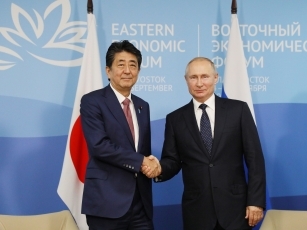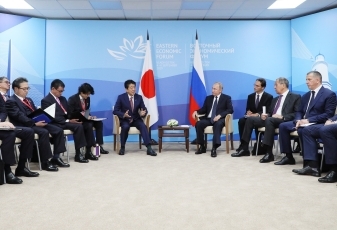Japan-Russia Relations
Japan-Russia Summit Meeting
 Photograph of the Japan-Russia Summit Meeting
Photograph of the Japan-Russia Summit Meeting (Photo: Cabinet Public Relations Office)
 Photograph of the Japan-Russia Summit Meeting
Photograph of the Japan-Russia Summit Meeting (Photo: Cabinet Public Relations Office)
On September 5, Mr. Shinzo Abe, Prime Minister of Japan, visited Vladivostok in the Russian Federation to attend the Eastern Economic Form, and held his 27th Japan-Russia Summit Meeting with H.E. Mr. Vladimir Vladimirovich Putin, President of the Russian Federation. The overview of the meeting is as follows (plenary meeting for approximately 1.5 hours in total, including a one-on-one meeting for approximately 20 minutes).
Both leaders confirmed to hold their next Summit Meeting on the occasion of the Asia-Pacific Economic Cooperation (APEC) Economic Leaders’ Meeting in Chile in November.
1. Peace treaty
(1) Negotiations on a peace treaty
- The two leaders held a candid and open exchange of views on the issue of concluding a peace treaty and reconfirmed to work in a future-oriented manner.
- The two leaders reiterated instructions to their respective foreign ministers, who are responsible for negotiations, to advance joint work in order to find a mutually acceptable solution.
- Prime Minister Abe conveyed Japan’s position on the Four Northern Islands, also bearing in mind the recent participation of President Putin via live video link in the opening ceremony of a newly-built fishery processing plant on Shikotan Island.
(2) Joint economic activities on the Four Northern Islands
- The two leaders welcomed the implementation of pilot projects in the areas of tourism and garbage disposal, on which they shared the view at the time of the Summit Meeting in June. They confirmed that vigorous efforts will continue to be made to ensure the steady implementation of remaining projects.
Japanese experts are scheduled to visit the Four Northern Island from September 13 to 16. It has also been confirmed between Japan and Russia that a pilot tour to the Four Northern Islands will take place during October.
(3) Humanitarian measures for the former island residents
- The two leaders welcomed that grave visits by airplane have now been realized for three consecutive years, that visits to restricted access areas during grave visits have been achieved, and that temporary additional entry/exit points have been established. Prime Minister Abe called for grave visits by airplane to be implemented from next year on an annual basis.
2. Economy
- The two leaders confirmed the specific outcomes relating to the Eight-point Cooperation Plan. In particular the leaders welcomed the final investment decision on the Arctic LNG 2 Project, and the conclusion of the special investment contact by Toyota in St. Petersburg.
3. Security
- The two leaders welcomed the progress achieved at working-level in the field of security cooperation.
(1) Cooperation between defense authorities: Visit to Russia by Chief of Staff, Japan Ground Self-Defense Force (JGSDF) General Yuasa (May); first-ever participation of JGSDF Central Band in Spasskaya Tower International Military Music Festival in Russia (August); and visit to Japan of Commander-in-Chief of the Russian Navy, Admiral Yevmenov (November).
(2) Cooperation between coast guard authorities: Visit of the Commandant of the Japan Coast Guard, Admiral Iwanami to Russia and the holding of the Japan-Russia Coast Guard Meeting (July); and the second Coast Guard Global Summit (November, Tokyo).
(3) Counter-narcotics: Training under the Domodedovo Project (development of approximately 200 counter-narcotics experts in the past five years).
4. International situation
- In the course of the various exchanges pertaining to the international situation, the two leaders also discussed the matter of Russia rejoining the G8.
- Regarding North Korea, bearing in mind the recent situations, the two leaders held discussions toward the denuclearization of the Korean Peninsula, which is a common goal for Japan and Russia, and confirmed that they will continue to coordinate closely.
- In light of rising tensions in the Middle East, including Iran, the two leaders raised the issue of the situation in the Middle East.

